WASHINGTON, D. C. -- International approval of U.S. leadership lost some of its momentum in 2010 after soaring in 2009. Even so, U.S. leadership is still relatively better positioned worldwide than at any time during the last two years of the Bush administration. Across 116 countries, median approval of U.S. leadership in 2010 stood at 47% -- relatively unchanged from the 49% median across 111 countries in 2009.
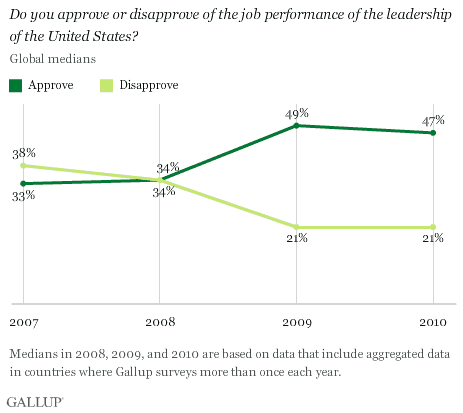
A closer look at where U.S. leadership stands at the regional and country levels reveals specific areas of growth and opportunity. The image of U.S. leadership continued to fare better in Africa in 2010 than anywhere else in the world, with an 84% median approval rating that was largely thanks to strong majority approval in sub-Saharan Africa.
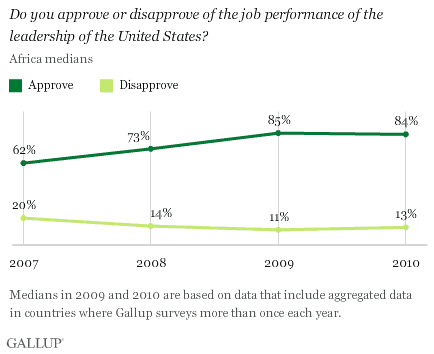
However, U.S. leadership approval fell significantly in several African countries between 2009 and 2010, including drops of at least 10 percentage points in Algeria and Egypt. Approval in the region was lowest in Tunisia and Egypt, where 19% said they approved, but the declines in each country did not offset on the heels of Obama's speech to the Muslim global community from Cairo.
Perceived Letdown in the Americas
The only place in the world where U.S. approval ratings suffered on a large scale in 2010 was in the United States' own hemisphere. After an initial surge when Obama took office, median approval in the Americas dropped from 53% to 44%.
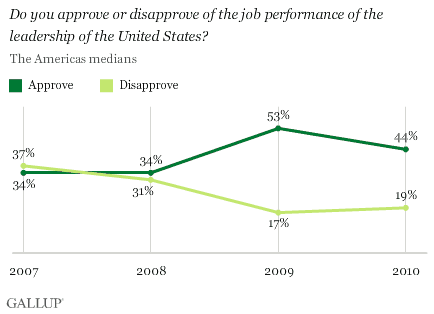
Approval fell significantly in half of the surveyed, taking the largest hits in Mexico, Argentina, Venezuela, and Honduras. Ratings did not change significantly in the other half of the countries in the region.
Europe Stable After Big Increase
Median approval in Europe remained stable at 45% in 2010, after registering some of the sharpest increases in approval of U.S. leadership worldwide between 2008 and 2009. Europeans' median approval is still more than twice as high as it was during the last years of the Bush administration.
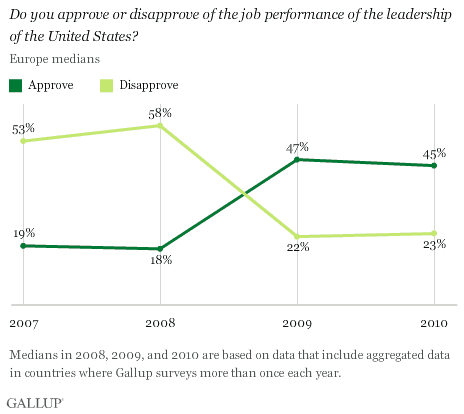
Although approval remained steady across in 2010, it did drop by more than 10 points in countries where the effects of the global financial and economic crisis remain severe, including Greece, Ireland, and Portugal. There were double-digit drops in approval in six countries between 2009 and 2010: Slovenia, Greece, Croatia, United Kingdom, Ireland, and Portugal. There were double-digit increases in two: and Hungary.
Approval Steady in Much of Asia
Views of U.S. leadership vary considerably across , but approval was generally stable between 2009 and 2010 and still on a positive trajectory with a median approval rating of 41%. Ratings in most of the region tended to be on the plus side, except for the Middle East and parts of South Asia, where residents were still more likely to disapprove than approve.
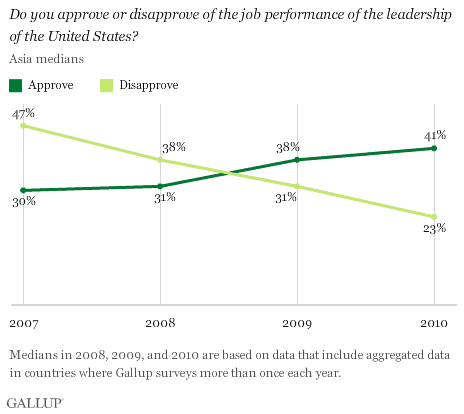
The United States' image suffered among some key regional allies in the region. Ratings declined 19 points in the United Arab Emirates between 2009 and 2010, and 15 points in Japan over the same period. Ratings continued to decline in Israel and India, but not nearly to the same degree.
Big Losses in Every Region
The list of countries where approval of U.S. leadership dropped substantially in 2010 is nearly four times longer than the list of countries with sizable gains. It also represents every major global region and includes major nations. Notably, U.S. leadership lost significant ground in three Arab countries -- United Arab Emirates, Egypt, and Algeria -- but the relatively low approval ratings are still higher in Egypt and Algeria than during the Bush administration.
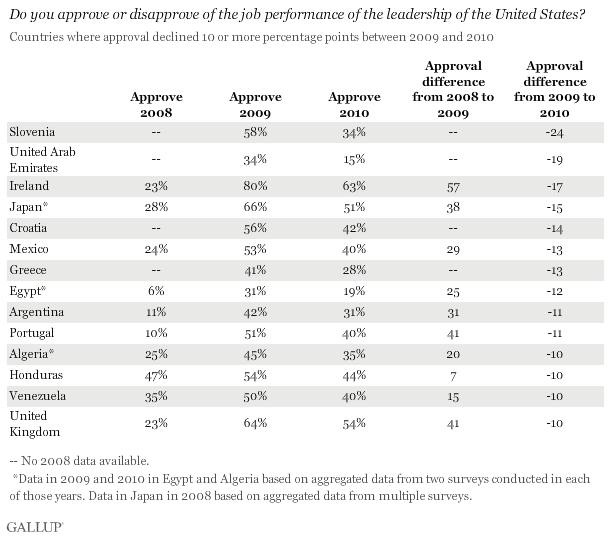
Big Gains in a Few Countries
U.S. leadership approval made substantial gains in an eclectic collection of four countries: Hungary, Ukraine, Iraq, and Ghana. In Hungary and Ukraine, approval increased, reaching a majority in Hungary. U.S. approval continued to build in Ghana, with back-to-back increases of 11 points each year. Iraq's approval ratings, however, returned to where they were in 2008 after slipping 11 points in 2009.
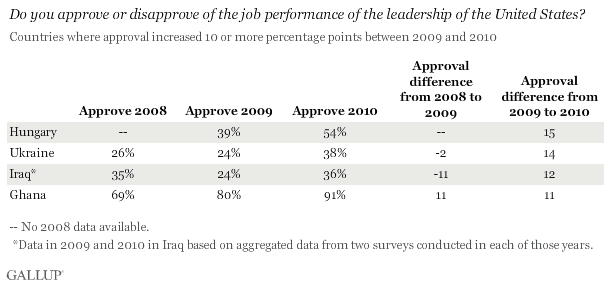
Implications
Worldwide, views of U.S. leadership are better than they were in 2008, but the 2010 data suggest that the honeymoon is likely over and now the hard work begins. The U.S. is well-poised to increase its engagement with Africa, which the White House has said it will seek to do in 2011. At the same time, the perceived letdown among key partners in Latin America, particularly neighboring Mexico, underscores a need for policymakers to re-engage with the region as a whole.
the complete findings from the U.S.-Global Leadership Project.
Visit feature to learn more about the countries where residents have soured the most on U.S. leadership.
For complete data sets or custom research from the more than 150 countries 优蜜传媒continually surveys, please contact SocialandEconomicAnalysis@gallup.com or call 202.715.3030.
Survey Methods
Results are based on face-to-face and telephone interviews with approximately 1,000 adults, aged 15 and older, conducted throughout 2009 in 111 countries and 2010 in 116 countries. In Algeria, Comoros, Egypt, Iraq, Lebanon, Mauritania, Morocco, Palestinian Territories, Somaliland region, Tunisia, and Yemen, measures are aggregated based on two surveys conducted in 2009 and 2010. Data from Austria, Bulgaria, Czech Republic, Libya, and Russia in 2010 are based on aggregated data from two surveys that year. Results in Bahrain, Djibouti, Kuwait, Poland, Qatar, and Saudi Arabia in 2009 are based on aggregated data from two surveys that year. Results in Pakistan are based on aggregated data in 2008 and 2009. Results in Germany and Japan in 2008 are based on aggregated data for multiple surveys that year. For results based on the total samples, one can say with 95% confidence that the maximum margin of sampling error ranges from ±1.7 percentage points in India to ±5.7 percentage points in Slovenia. The margin of error reflects the influence of data weighting. In addition to sampling error, question wording and practical difficulties in conducting surveys can introduce error or bias into the findings of public opinion polls.
